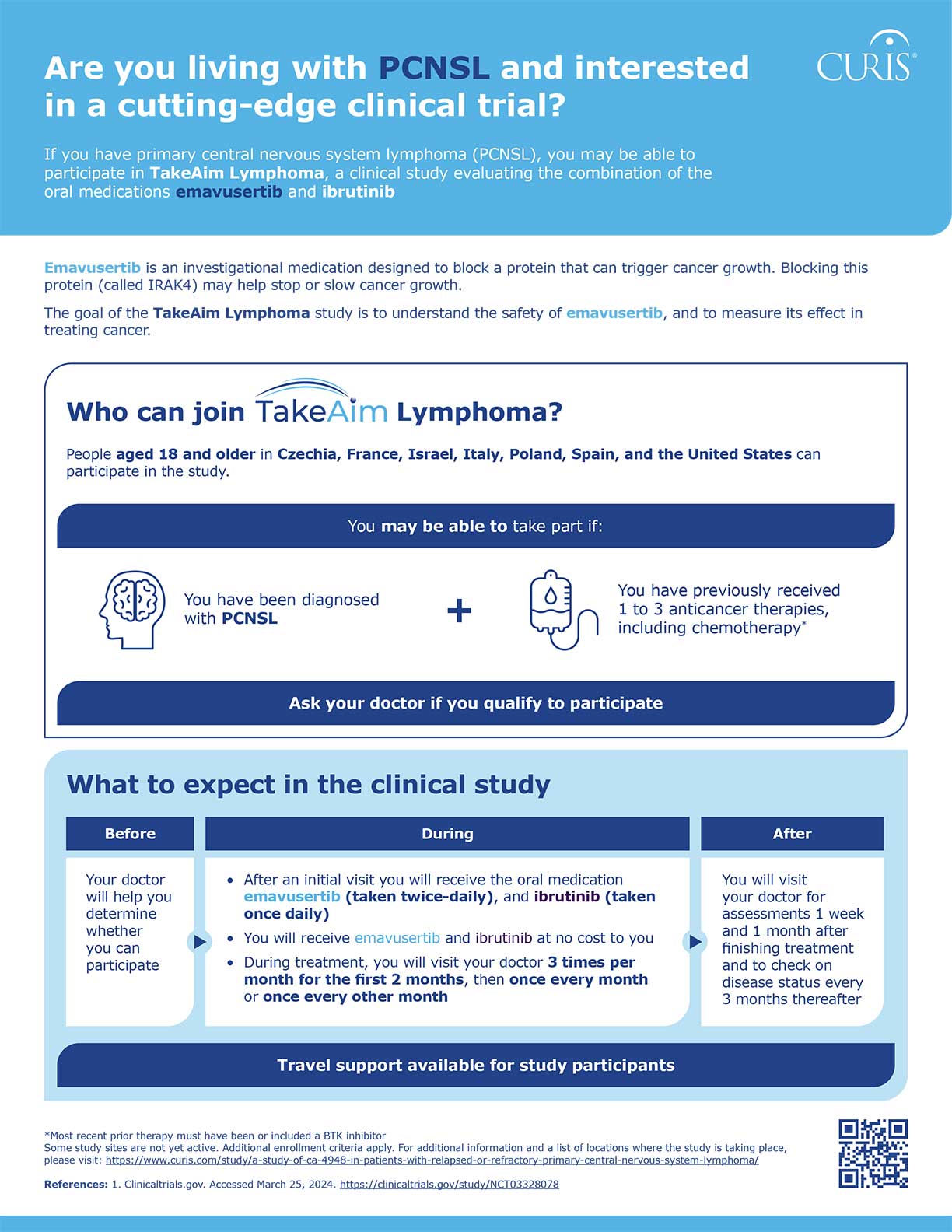We are developing and delivering novel therapies that improve patients’ lives.
Curis is extremely thankful for the commitment that the patients, families, investigators and hospitals make when they participate in our clinical studies. Patient participation helps to provide data which can provide a better understanding of disease and potential therapies. Curis is conducting clinical trials to evaluate the efficacy and safety of an investigational drug (CA-4948) in cancer.
Participating in Curis Clinical Trials:
Patients may be provided Curis’ investigational drugs in the following ways (after meeting qualifying criteria): by participating in clinical studies, through expanded access programs (EAPs), and through investigator-sponsored or investigator-initiated studies.
Diversity in Clinical Trials:
Curis is deeply committed to fostering diversity in our clinical trials. We understand that health conditions can affect people differently based on factors such as age, race, ethnicity, gender, and socioeconomic background. By prioritizing diverse patient participation, we aim to ensure that our investigational therapies are evaluated across varied populations, leading to more comprehensive data and equitable healthcare solutions. This commitment helps us better address the unique healthcare needs of all patients and advance more impactful treatments.
Investigator-Sponsored Trial (IST) or Investigator-Initiated Trial (IIT):
Similar to clinical studies, IST or IIT studies provide qualifying patients with access to investigational drugs. Data is collected to better understand safety and efficacy where the sponsor-investigator assumes responsibility for all aspects of the research.
For IST or IIT requests by physicians click here
FAQs
What are clinical studies?
Clinical studies are scientific studies which seek to find better ways to understand and provide therapies to treat disease in certain groups of people. Clinical studies produce data which is used to make decisions about health care therapies.
What are the potential benefits and risks of taking part in a clinical study?
The potential benefits and risks are reviewed thoroughly with patients through an Informed Consent process and may include the following:
Potential study benefits:
- Patients may gain access to an investigational drug before it is available to everyone.
- Patients may play a more active role in their own health care.
- Researchers may provide patients with medical care and more frequent health check-ups as part of their participation in the study.
- Patients may have the chance to help others get better therapies for their health problems in the future.
Potential study risks:
- The investigational drug may cause side effects.
- The investigational drug may not be effective.
- The investigational drug may not be better than standard treatment.
- There may be other risks which are reviewed with patients during the consenting process.
How is a patient eligible?
Patients must meet the eligibility criteria of a study in order to participate. These criteria are defined in a study protocol and reviewed and approved by Institutional Review Boards (IRBs) prior to patient participation.
Patient Resources

American Brain Tumor Association
Advancing the understanding and treatment of brain tumors with the goals of improving, extending and, ultimately, saving the lives of those impacted by a brain tumor diagnosis.

End Brain Cancer Initiative
Dedicated to ensuring all patients diagnosed with brain cancer, a brain tumor, or metastatic brain disease have equal access to advanced diagnostics, clinical trials, FDA-approved treatments, specialists, and one-on-one patient services/support.

National Brain Tumor Society (NBTS)
NBTS unrelentingly invests in, mobilizes, and unites the brain tumor community to discover a cure, deliver effective treatments, and advocate for patients and caregivers.

Leukemia & Lymphoma Society (LLS)
The Leukemia & Lymphoma Society (LLS)
The leading source of free blood cancer information, education and support, LLS helps patients navigate their cancer treatment by ensuring they have access to quality, affordable, coordinated care.

Lymphoma Research Foundation (LRF)
The Lymphoma Research Foundation’s mission is to realize the promise of science to eradicate lymphoma and serve the community touched by this disease.

Brain Tumor Network
Brain Tumor Network provides free, individualized navigation help to patients and caregivers diagnosed with a primary brain tumor diagnosis. Our services are unbiased, at no cost and available to patients across the United States. Our personalized navigation services include: Disease and treatment option education, personalized clinical trial searches based on a patient’s specific biomarkers, treatment center identification and second opinion facilitation, and social work support services.

National Organization for Rare Disorders
Improving the health and well-being of people with rare diseases by driving advances in care, research, and policy.
